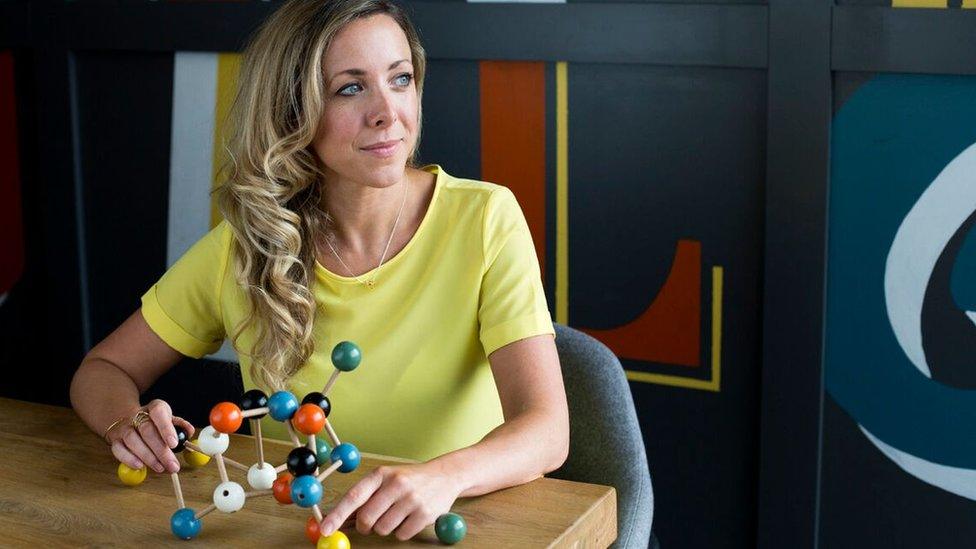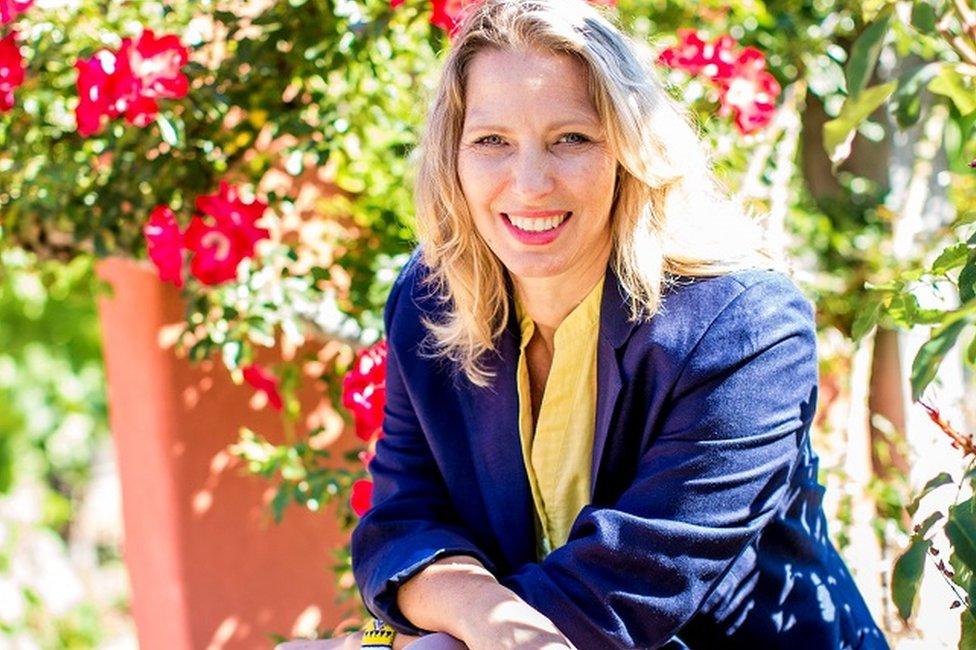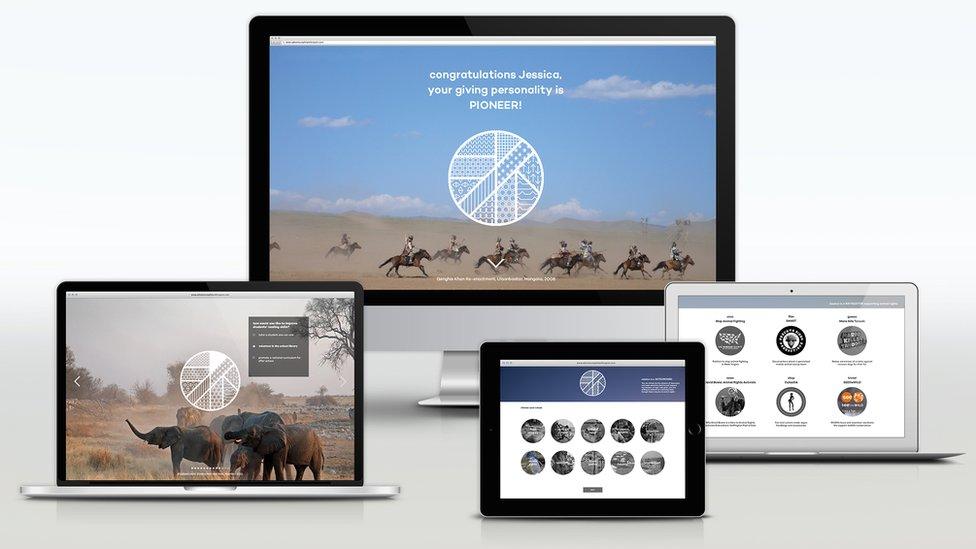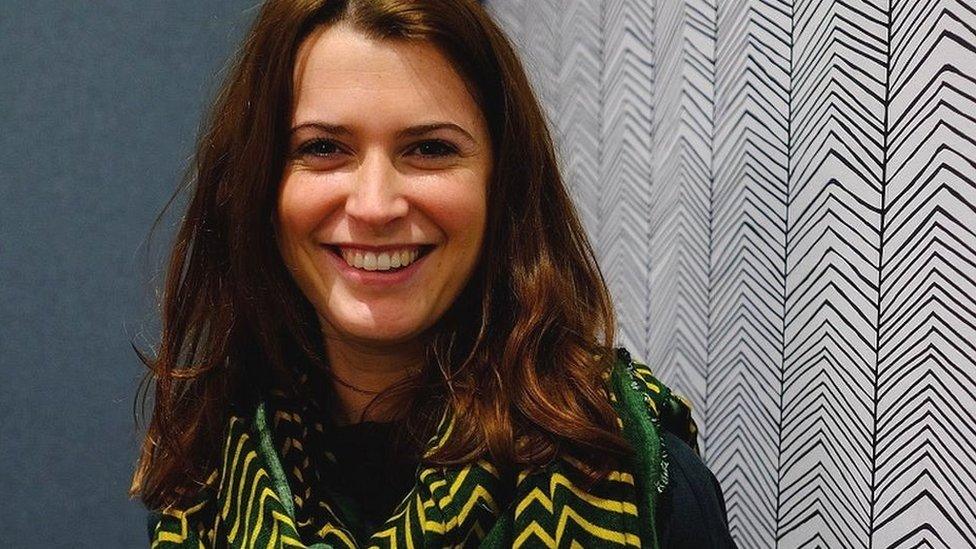Meet the female entrepreneurs using tech for good
- Published

When Jude Ower entered the gaming industry she was one of very few women
Jude Ower loved playing video games as a child, but she never dreamed that her passion would eventually become a force for good and win her accolades and honours.
After 12 years making games for education and training, she went on to create an international games platform with a social conscience - Playmob.
"After the 2010 Haiti earthquake, Zynga, the creator of Farmville, launched a campaign to raise funds for the victims by selling an in-game item, with a percentage of each purchase going to help the victims," she explains.
"It was massively successful and raised over $1m in a matter of days. It was then I thought: 'Maybe I could make a platform that connected games and causes?'"
Playmob pairs games developers or businesses with a charity and then sets up in-game advertising campaigns. By clicking on links within the game, players can make donations.
The campaigns have helped more than 3,000 teenagers receive counselling for cyber-bullying, provided protection for 31 pandas, and secured education for 8,500 children in Africa and Asia, the company says.
"With Playmob we can track the social impact, such as number of trees planted, number of meals provided, water wells built, and so forth," she says.
"This allows players to see that the more they play and interact with the branded content, the more good they do."
So far the games platform has raised more than $1m for charities over the past five years, and more than 1.5 million players have interacted with charitable in-game content.
Her success saw her awarded an MBE (Member of the Order of the British Empire) in 2015 for services to entrepreneurship and she's been voted one of the top 100 Women in Tech in Europe.
Ms Ower is just one of a growing number of entrepreneurs - many of them women - exploring how technology can be harnessed in the cause of philanthropy.
This is tech for social good, or "philtech" as it's sometimes called.

Erin Michelson had all the trappings of financial success but felt "terribly unhappy"
Erin Michelson's high-flying banking career took her to Hong Kong, Chicago, New York and San Francisco, where she rose to vice president and director of philanthropic management at Bank of America.
But despite seemingly having it all, she felt there was something missing.
"I realised that even though I had all the trappings of success, I was terribly unhappy," she says.
"So I quit my job, sold everything I owned, set up a charitable fund, and headed out on a two-year around-the-world trip volunteering with humanitarian organisations."
Taking only one suitcase, she spent 720 days travelling to 62 countries across all seven continents - an adventure that helped her find meaning in her life, she says.
After writing a book about her experiences, she returned to San Francisco and founded Summery, a data analytics company that has developed a piece of online software similar to the Myers-Briggs personality test, external.

Summery helps firms match their charitable projects with their employees' personalities
The program combines behavioural science and analytics to give employers an idea of their staff's social priorities and attitudes towards giving, which she says helps inform companies how to focus their charitable efforts.
"The test matches you with one of 10 'giving' personalities and provides a snapshot of your giving DNA, one of 59,048 possibilities," says Ms Michelson.
By taking the guesswork out of charitable giving, she says it can improve the relationship between employer and staff, to everyone's benefit.
"Engaged employees lead not only to better corporate performance, but also significant cost savings through stronger retention and more targeted recruitment based on cultural appreciation," she says.
Richard Craig, chief executive of the Technology Trust, which helps charitable organisations use tech more effectively, says: "Over the last couple of years there has been a noticeable trend in graduates specifically looking for roles in charities and non-profits who might previously have looked to careers in the City, for example.
"I am seeing the same trend with technology start-ups, with a proportion looking to deliver social good either as non-profits themselves, or commercial organisation with social purpose."

Good-Loop's Amy Williams says she saw "untapped potential" in online advertising
It was while working for an advertising agency in London that Amy Williams had her "philtech epiphany".
"I saw firsthand the huge amount of money that gets passed from one big conglomerate to another, buying and selling the cheap commodity of our attention online," she says.
"The stark contrast between these two worlds really hit me - £4.7bn was spent on online advertising in the UK last year."
She quit and went travelling, working as a volunteer for a small charity in Argentina called Food For Thought, which specialises in nutrition education for kids.
"I started started to see the untapped potential within online advertising to make some real positive impact."
Inspired by her experiences, she founded Good-Loop, a company that rewards viewers of video ads with donations to their chosen charities.
Brands create a video and if the visitor watches it for 15 seconds or more, the advertiser pays 50p - with 50% of that going to the chosen charity, 40% to the content creator, and 10% to Good-Loop.
She says the process makes viewers more engaged with brands because they have opted to watch the content rather than having it forced upon them.
Playmob's Jude Ower believes recent political events in Europe and the US have fired up younger generations to get more involved in socially responsible causes.
"We are seeing people leave well-paid jobs to take a risk and set up on their own, not just in the hope of creating a successful start-up, but to do something with purpose."
Follow Technology of Business editor Matthew Wall on Twitter, external and Facebook, external